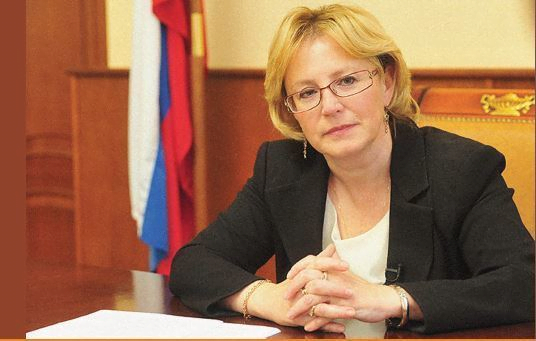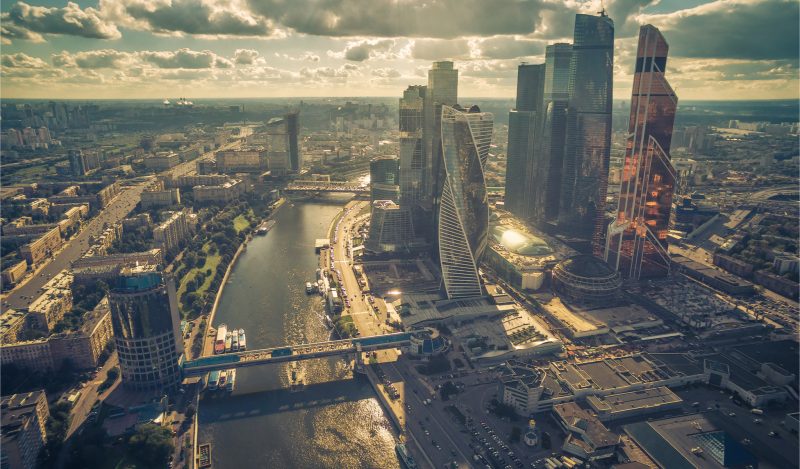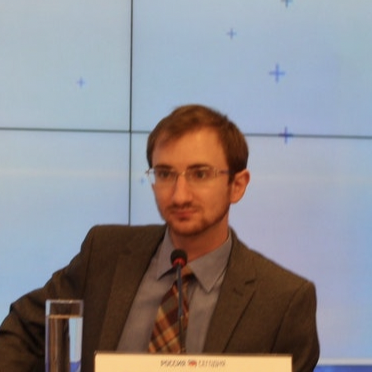One can’t help but feel a certain kinship with Mikhail Delyagin, the State Duma deputy who perfectly captured the zeitgeist of our era while sizing up the omnipotent sanitary doctors and thespian technocrats lording over Russia.
“The state now speaks so boorishly to the people. This is how they talk to the population of the occupied territories, who for some reason do not understand that they are occupied,” the Russian lawmaker said in a recent video message.
According to Delyagin, the adoption of a nationwide digital “health” pass—which is expected to occur in the coming weeks—would in essence transfer external management of Russia to Big Pharma and Big Tech.
His provocative analysis was promptly scrubbed from YouTube.
In truth, the imminent “coup d’état” described by the Duma deputy has all but taken place. All 85 federal subjects of the Russian Federation have issued decrees tying vaccination status to certain types of employment—with some regions even demanding that all state, municipal and private organizations ensure 100% of employees are fully vaccinated or have medical exemptions.
Public health apartheid is alive and well in Russia. Region-specific rules requiring QR codes for various aspects of what was once considered normal life have been accentuated by local flavors of vaccine sadism. The governor of the Novgorod region recently announced that children whose parents have not been injected will be bannedfrom after-school clubs and other extracurricular activities.
How did a nationwide “non-working week” in March 2020 become a nationwide vaccine caste system in less than two years?
A ‘hypothetical phenomenon’ attacks Moscow
Excluding a knee-jerk lockdown at the start of the pandemic, Russia had largely avoided the spirit-crushing restrictions embraced by much of the developed world. The turning point came in mid-June, when the country’s first compulsory vaccination policy was introduced in the capital. At the time, authorities were growing increasingly frustrated by the lack of local enthusiasm for Russia’s flagship vaccine, Sputnik V, developed by the health ministry’s Gamaleya Center.
On June 15—a day before Moscow Mayor Sergey Sobyanin announced a decreeordering businesses in various sectors to vaccinate 60% of their employees—Alexander Gintsburg, Gamaelya’s director, warned Russia’s capital might be under attack from a distinctive and possibly uniquely dangerous “Moscow” strain of coronavirus.
“At present, a study of the Moscow strain and the effectiveness of Sputnik V against it is underway. We think the vaccine will be effective, but we must wait for the results of the study,” Gintsburg told RIA Novosti.
A week later, the Moscow strain disappeared into the ether. Russia’s State Research Center of Virology and Biotechnology issued a brief statement on June 23 explaining that the ominous mutation was “for the most part a conditional and hypothetical phenomenon.”
Meanwhile, coercive vaccination policies began to spread to other parts of Russia. Hailed by the Russian government as a “new tool,” compulsory vaccination hit a very brief bump in the road after Labor Minister Anton Kotyakov argued it would be unlawful for employers to fire workers who refused the shot. He corrected himselfseveral hours later, noting it would be perfectly legal for unvaccinated employees to be “suspended indefinitely” without pay.
None of this is to suggest that people weren’t becoming seriously ill. Moscow saw a worrying spike in COVID-related hospitalizations in June and early July. But as the city’s own health department quietly acknowledged, the increase in excess bed occupancy was largely due to nosocomial infections—patients who were hospitalized for other reasons who later tested positive for coronavirus.
In fact, Moscow’s best-known COVID ward was once described as a hotbed of hospital-transmitted superinfections.
Denis Protsenko, who oversees the “red zone” at Moscow’s Kommunarka hospital, acknowledged in autumn 2020 that a huge number of “COVID” deaths were actually caused by sepsis stemming from hospital-transmitted infections.
“COVID-19 is not as bad as sepsis,” one Russian media outlet dryly remarked at the time.
On June 15, Protsenko told state-run RT that mandatory vaccination was the only wayto defeat coronavirus. A day later—as we mentioned earlier—compulsory vaccination for certain business sectors was announced in the capital.
Coincidentally, on June 19 Protsenko was nominated for a seat in the State Duma. He accepted the honor after receiving a telephone call from Russian President Vladimir Putin.
The world’s leading research institution
Russia’s current trajectory is at least partly guided by the government’s insistence that Sputnik V’s safety and efficacy are unassailable.
Sputnik V is based on Gamaleya’s human adenovirus vector platform (Ad26 and Ad5), which is designed to transport genetic material into cells. If you examine the 2012 patent application for Gamaleya’s influenza shot (which is posted on Sputnik V’s official website), the technology now being used for Sputnik V is openly referred to as a “genetic vaccine.”
Interestingly, Gamaleya’s director, Alexander Gintsburg, said in a December 2020 interview that there are no “significant” differences between Sputnik V and AstraZeneca’s vaccine—which has been plagued by safety concerns.
Those who point to the fact that expedited Phase III trials for Sputnik V are still a year from completion have been reassured there is no reason to doubt the drug’s longer-term safety. The Kremlin has batted away criticism of Sputnik V’s hypersonic development and rollout by highlighting the Gamaleya Center’s previous successes with developing viral vector vaccines.
For example, Kirill Dmitriev, the Harvard-educated ex-Goldman Sachs banker who heads the Russian Direct Investment Fund (which provides financing for Sputnik V), claimed in a September 2020 op-ed that “Russia has benefitted from modifying for COVID-19 an existing two-vector vaccine platform developed in 2015 for Ebola fever, which went through all phases of clinical trials and was used to help defeat the Ebola epidemic in Africa in 2017.”
Actually, only about 2,000 people in Guinea received Gamaleya’s Ebola vaccine in 2017-18 as part of a Phase III clinical trial. Typically, Phase III trials involve tens of thousands of participants and often require half a decade or more of meticulous data collection and monitoring. The modest scope of the trial was complemented by its very curious timing. Guinea was declared Ebola-free in June 2016 and remained that way for nearly five years. Contrary to Dmitriev’s creative prose, there was no Ebola epidemic in need of “defeating” when Gamaleya’s scientists arrived in Guinea in 2017 to begin small-scale tests of their experimental shot.
Gamaleya’s Ebola shot is currently only registered with Russia’s health ministry—which operates the institute. In a September interview with Forbes Russia, Inna Dolzhikova, who helped develop Sputnik V, argued there was no reason to seek international approval for Gamaleya’s Ebola vaccine because there have been no “large outbreaks” requiring inoculation against the deadly virus.
Not quite. Ebola re-emerged in Guinea in February of this year, prompting the African nation to undergo an emergency vaccination program. Gamaleya’s “proven” viral vector platform was conspicuously M.I.A.—suggesting its Ebola shot had hit a dead-end.
Before launching Sputnik V into orbit, Gamaleya repeatedly failed to send an approved drug beyond Russia’s own borders. The institute’s first attempt at a vector adenovirus vaccine, AdeVac-Flu, resulted in a multimillion-dollar embezzlement scandal.
The institute’s business dealings came under scrutiny, again, in November after a Russian media report—based on open-source government documents—revealed that Gamaleya was outsourcing the production of its own “brand” of Sputnik V, which it was supposed to be manufacturing itself. Gamaleya paid an unnamed third party, in both rubles and US dollars, for batches of its own drug that were later resold and distributed across Russia.
It’s no wonder Gamaleya crowned itself “the world’s leading research institution.”
‘We speak only the truth’
There was a brief lull in the introduction of new COVID-related measures for several weeks starting in August. It seemed the epidemiological situation had stabilized, sparing authorities from having to impose highly unpopular vaccine decrees ahead of the State Duma elections at the end of September.
On September 23, a day before the election results were announced, Annette Kyobe, the IMF representative in Moscow, suggested that “after the parliamentary elections, perhaps a more unpopular measure, like mandatory vaccination, can be initiated as early as October-November” in Russia.
A new wave of coronavirus had arrived in Russia just days before; in the weeks that followed, daily COVD cases soared while virus-attributed deaths went up almost vertically. Authorities were forced to take decisive action. In less than a month, every region of Russia had introduced some form of mandatory vaccination; QR codes were also widely adopted.
In November, Anna Popova, the head of the federal service for consumer rights protection and human welfare (Rospotrebnadzor), gave a firm finger-wagging to Russians who questioned the rationale behind the tsunami of life-altering controls.
According to Popova—whose agency recently extended mask rules and other “sanitary” measures until 2024—from “the very first days” of the pandemic, the Russian government had resolved to “speak only the truth.” However, she acknowledged that she needed to do a better job of explaining things “in a way that is understandable.”
“I attribute this to myself. I sometimes see that people who are not in my profession, they do not always understand. And this is my big task—to speak so that everyone understands what I am saying,” Popova said.
Russians have little choice but to take Popova at her word: the public has been left almost completely in the dark when it comes to COVID-related data that would help people assess the severity of the health crisis.
In Moscow, even basic information like COVID deaths by age group is nowhere to be found. There is not even a basic, regularly updated breakdown of virus-linked hospitalizations in the capital. Moscow’s health department issues a daily press release disclosing the number of new hospitalizations and the total number of patients on ventilators. That’s basically it, hospital data-wise.
On the vaccine front there is even less transparency. There is no VAERS-like database for reporting suspected adverse events and the government is either withholding, or unwilling to collect, data on reported side effects. Recently, an advocacy group that sought information on vaccine safety monitoring in the country was treated to a Kafkaesque bureaucratic merry-go-round.
According to Putin, “not a single serious case of complications” has been registered since the start of Russia’s nationwide vaccine rollout nearly a year ago.
It would be unwise to challenge this bold assertion. The Russian government is reportedly planning to threaten “active opponents of vaccination” with exorbitant fines and prison time. Authorities will specifically target doctors and medical professionals who pose a “threat to life” by participating in “anti-vaccine” activities.
Russia’s Fauci?
With the Omicron variant now covering the Earth, one of Russia’s entrenched public health bureaucrats has grabbed the mutation by its spike-protein horns. Veronika Skvortsova, chief of Russia’s federal biomedical agency, announced at the end of November that she was days away from creating a test kit specifically designed to detect Omicron infections.
Skvortsova, who previously served as Russia’s health minister, sits on the Bill Gates-funded Global Preparedness Monitoring Board (GPMB). Fellow board members include Dr. Chris Elias, President of the Bill & Melinda Gates’ Global Development Program, and Anthony Fauci.


The GPMB, as Robert F. Kennedy Jr. wrote in his new book on Fauci, is a global committee of technocrats that promotes “subduing resistance, ruthlessly censoring dissent, isolating the healthy, collapsing economies, and compelling vaccination” as necessary antidotes to worldwide health crises.
Like Fauci, Skvortsova has a long and colorful history of public service. As health minister, she presided over a years-long data manipulation scandal involving the not-so-subtle airbrushing of mortality rates.
In October 2019, Russia’s regional leaders were accused by then-prime minister Dmitry Medvedev of cooking their books without the federal government’s knowledge. Skvortsova’s health ministry fervently denied any involvement in the hoax.
Six months later COVID arrived and many of the same authorities who had bungled years of mortality figures began issuing “data-driven” public health decrees that “reset” the social contract between the state and society.
‘Good for the person’
As COVID-19 began spreading across the world in early 2020, Sberbank—Russia’s largest lender—sprang into action.
On February 27, 2020, CEO Herman Gref notified the government that his bank was ready to provide funding to Russian scientific institutions to help develop drugs to combat the virus. He also revealed that the company—which is majority owned by the state—was working on “masked face recognition technology” similar to China’s sophisticated biometric monitoring devices.
Both of these initiatives quickly produced fruitful results.
Sberbank played a key role in the genesis of Sputnik V, developed and registered in a record-breaking six months. According to Gref, the company was “included in the work on the creation of a vaccine”—what later became Russia’s flagship COVID shot—and helped “to ensure the transfer of technology to production sites.”
A “secret government order” reportedly issued by Prime Minister Mikhail Mishustin in December 2020 designated a Sberbank subsidiary as the sole supplier of Sputnik V to Russia’s regions. The Sberbank subsidiary shipped the first 9 million doses of the vaccine before transferring supply and delivery logistics to state conglomerate Rostec in March of this year.
Gref himself was one of the first people in the world to be injected with the vaccine. The head of Russia’s largest bank claims he got the shot sometime in April 2020—meaning he was likely part of controversial “informal trials” in which Gamaleya Center scientists injected themselves and family members with the experimental drug. “Formal” Phase I testing began two months later, on June 18.
Sberbank also succeeded in rapidly developing sophisticated facial recognition technology.
In May 2020, the bank announced it was ready to install video surveillance systems in Russian schools and universities that would be capable of recognizing masked faces and measuring a person’s temperature.
Moscow authorities recently announced they plan to introduce the technology in city schools by the end of 2022. Actually, the technology can hardly be called “new”: Russia began experimenting with biometric school ID systems several years ago. In 2019, the ministry of education said that all Russian schools will have facial recognition systems by 2024.
Today, Sberbank is far more than just a financial institution. Rebranded as “Sber” in September 2020, the company now offers “a whole universe of services for human life and businesses”: SberMarket, SberHealth, SberID, SberFood, SberSound. SberAI—among many others.
In partnership with Visa, Sberbank is working on a “biometric solution” for making payments. The company is also testing a QR code-based payment system. Such a system would certainty come in handy with the introduction of QR code-based “health” passes—and could potentially dovetail with Gref’s dream of teaming up with JP Morgan to create a “Sbercoin” crypto currency.
According to Gref, Sber’s rather conventional logo—a checkmark inside of a circle—is meant to represent the company’s focus on what’s “good for the person.”
Brave New Russia
Amid growing social, political and economic uncertainty, many Russians have started to speculate about what lies ahead. The Russian government appears to already have a roadmap in mind.
As part of a comprehensive re-envisioning of the Russian capital recently released by the mayor’s office, by 2030, residents of Moscow will have “genetic passports” used for administering “gene therapies.” Russians will also wear “implantable devices” that will calculate health insurance payments.
The “smart city” blueprint suggests Moscow is open for business—and is especially interested in attracting investment from pharmaceuticals. In fact, the Russian government has already signaled its eagerness to partner with Big Pharma.
In October, the Gamaleya Center began joint research with Pfizer. The Kremlin-Big Pharma partnership aims to create a “very successful” Sputnik/Pfizer cocktail, Kirill Dmitriev, head of the Russian Direct Investment Fund, said at the time. One of Sputnik V’s own developers recently voiced support for mixing Sputnik with mRNA vaccines, claiming that combining the Russian vaccine with “different technologies” would provide clear benefits.
Where is Russia going and why has it embraced such dubious, civilization-transforming COVID measures, in near-lockstep with its so-called Western rivals?
Perhaps Duma Deputy Delyagin was onto something.
Reposted from the author’s substack
Join the conversation:


Published under a Creative Commons Attribution 4.0 International License
For reprints, please set the canonical link back to the original Brownstone Institute Article and Author.









